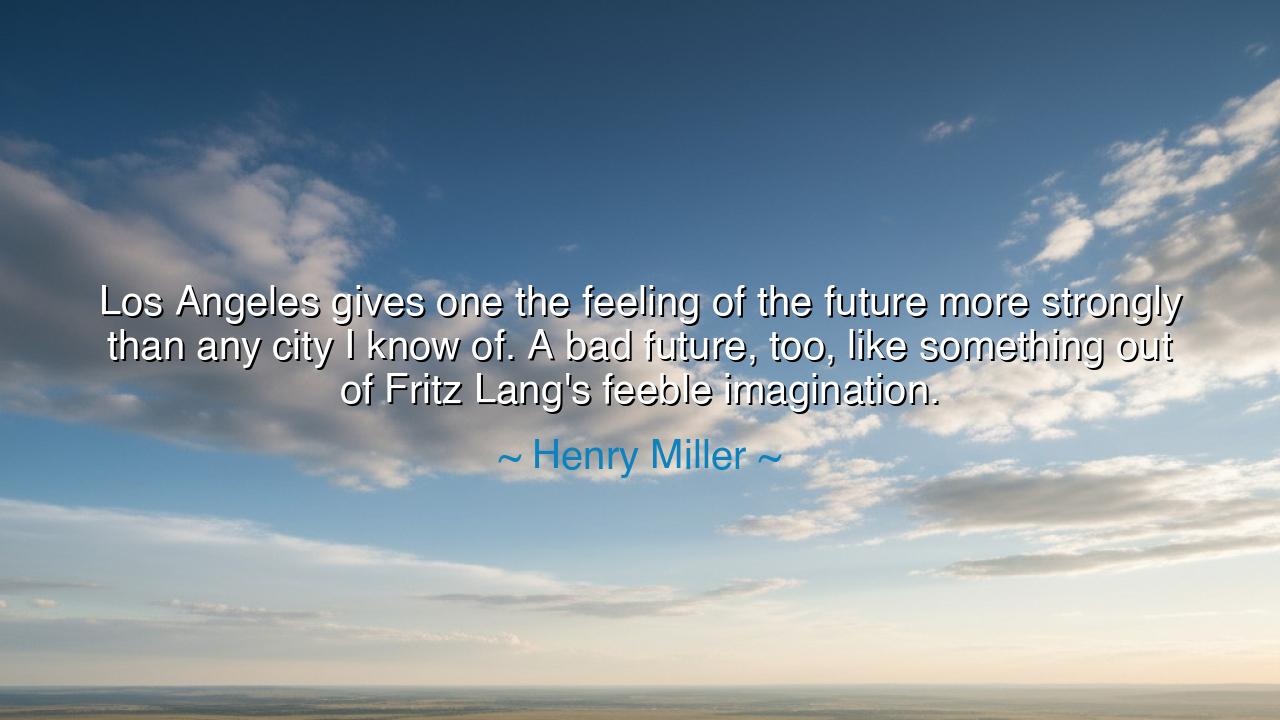
Los Angeles gives one the feeling of the future more strongly
Los Angeles gives one the feeling of the future more strongly than any city I know of. A bad future, too, like something out of Fritz Lang's feeble imagination.






In the great sweep of human history, cities have often served as the vessels of human ambition, the reflection of the collective dreams and fears of their inhabitants. They stand as monuments to the desires of generations, shaping the destinies of their people, while also casting shadows of caution. When the writer Henry Miller spoke of Los Angeles, saying, “Los Angeles gives one the feeling of the future more strongly than any city I know of. A bad future, too, like something out of Fritz Lang's feeble imagination,” he struck at the heart of a profound and unsettling truth. In this modern world, cities like Los Angeles—cities of progress, technology, and seemingly limitless possibility—can often feel like the embodiment of a distorted future, a vision where the promise of tomorrow has become twisted into something dark, sterile, and cold.
In Miller’s words, there lies an acute awareness of the dangers of unchecked progress, the potential for our dreams of the future to become nightmares. Los Angeles, with its sprawling highways, gleaming towers, and ever-present technology, embodies the vision of a future where human connection is fragmented, and the soul of a city is consumed by its own relentless drive for growth. It is a place where the human spirit is often eclipsed by the mechanical, where the very advancements that should uplift society instead create a hollow existence. Like a vision from the film Metropolis, where towering skyscrapers and oppressive machinery dominate the landscape, Miller’s view of Los Angeles hints at a future where progress comes at the cost of humanity itself.
This is not a new warning. Plato, in his Republic, spoke of a society where the desire for progress and technological advancement could easily overshadow the virtue of its people, leading them into a world where the individual is lost amidst the machinery of state and society. In this ancient vision, progress was not inherently good or bad, but required a balance—a balance that was too often lost in the relentless pursuit of power and wealth. Similarly, Miller’s critique of Los Angeles speaks to the dangers of a future that is shaped by capitalism, consumerism, and the desire for control. It is a future that may appear as a grand achievement, yet is built on the erosion of what truly makes us human—our connections to one another and to the earth.
Consider the rise of Rome, that once-mighty empire whose monumental achievements in architecture, law, and governance left an indelible mark on the world. Yet, as the empire grew in power and influence, it began to lose sight of the very values that had made it great. Greed, corruption, and the disconnection between the rulers and the ruled set the stage for its eventual collapse. The cities of Rome, with their towering edifices and bustling forums, were once symbols of progress and unity, but in time, they became havens of excess, a warning to future generations that even the brightest achievements can cast the darkest shadows.
In modern times, Miller’s observations resonate in the form of cities like Los Angeles, which have become icons of a future where the dreams of a better life are overshadowed by a pervasive sense of emptiness. Here, in the sprawling urban jungle, technology promises to solve every problem, yet often leads to a greater sense of alienation. The dream of individuality becomes distorted, as people are more connected than ever before, yet more isolated. The vision of progress becomes a machine that grinds forward, leaving behind those who cannot keep pace, and ultimately, those who suffer as a result of a system that was supposed to uplift them.
Miller’s quote serves as a warning to all who would follow in the footsteps of those who have built cities of wonder and fear. It reminds us that the future, while filled with potential, is also fraught with peril. Progress must be tempered with humanity, and technology must be wielded not as a tool of domination, but as a means of connection and understanding. Without this balance, the future that we create may become one of despair rather than hope. It is essential that we do not lose sight of the values that make life worth living—the bonds between us, the beauty of the natural world, and the importance of community.
Thus, let the cities of today stand not as cold, mechanical monuments to our ambition, but as living, breathing entities that reflect the best of our shared humanity. The lesson of Miller’s warning is clear: the future we are creating must be one that serves the spirit of mankind, not just its material desires. Let us remember the words of the ancients and strive to create a world that values connection, balance, and sustainability—a world where progress uplifts us all, rather than diminishing us. Let the future be a beacon of hope, not a shadow of our own making.






AAdministratorAdministrator
Welcome, honored guests. Please leave a comment, we will respond soon